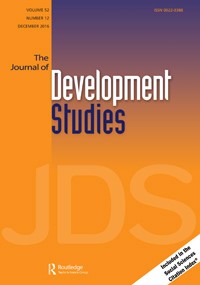Journal of Development Studies 52:12
The latest issue of the Journal of Development Studies includes a special section on the politics of taxation, with several articles by ICTD researchers.
The Politics of Taxation: Introduction to the Special Section (Paywall)
Christian von Haldenwang & Armin von Schiller
Domestic revenue mobilisation has received growing attention in recent years. International players such as the Organisation for Economic Co-operation and Development (OECD), the World Bank and the G20 are calling for more determined action to combat tax evasion and avoidance. Developing countries are urged to increase their own tax collection. However, implementing and sustaining tax reforms has proven to be a challenging task for many governments. This special section provides new evidence on the political factors determining taxation in developing countries. The articles gathered here address two distinct yet related questions: first, which factors shape long-term taxation patterns and why are these patterns so difficult to change even when they prove to be dysfunctional in many ways? Second, which factors determine the fate of specific tax reforms? Evidence from case studies covering six countries is complemented by a statistical analysis of factors influencing revenue vulnerability in the face of external shocks.
Tax Revenue Performance and Vulnerability in Developing Countries (Open Access)
Oliver Morrissey, Christian Von Haldenwang, Armin Von Schiller, Maksym Ivanyna & Ingo Bordon
This paper addresses vulnerability of revenue to external shocks using export composition to capture economic structure and differentiating countries according to income levels, resource endowments and political regimes. This gives a richer characterisation than previous studies. Lower income countries are vulnerable to shocks, especially in terms of trade (associated with the greatest revenue loss): democratic regimes seem to be less vulnerable to revenue losses due to shocks than non-democracies whereas revenue in resource rich countries is more vulnerable to shocks (except natural disasters) than non-resource rich countries. We find a negative relationship between manufacturing exports and revenue in lower income countries.
Mirza Hassan & Wilson Prichard
This paper explains the persistence of a tax system characterised by low revenue collection and extensive informality in Bangladesh. It combines analysis of long-term formal and informal institutions and of micro-level incentives shaping negotiation of short-term reform. The system is unusually informal, discretionary, and corrupt, but remains resistant to change because it delivers low and predictable tax rates to business, extensive opportunities for corruption to the tax administration, and an important vehicle for fundraising by political leaders and rent distribution to their elite supporters. We then explore the dynamics of micro-level reform and external pressure within the constraints of this overarching political bargain.
Armin von Schiller
This paper explores the relationship between socio-political institutions and tax composition in developing countries. It argues that strong business organisations and stable political party systems reduce the uncertainty of fiscal contracts for economic elites. The decrease in uncertainty leads elites to accept a larger share of the tax burden, which governments then collect using progressive tax types more intensively. To illustrate this claim, I provide evidence from a comparative analysis of the Peruvian and the Colombian tax history between 1970 and 2010.
Aid and Taxation in Ethiopia (Open Access)
Giulia Mascagni
The relation between aid and taxation is largely contested in the literature. On the one hand, aid may act as a substitute for tax revenue and thus have a crowding-out effect. It can also have a detrimental effect on domestic tax institutions. On the other hand, it can promote and support tax mobilisation through policy advice, technical assistance, and conditionality, in addition to more indirect channels. The case of Ethiopia supports the existence of a positive relation between aid and tax, which occurs mainly through policy advice and technical assistance rather than conditionality. This finding is grounded in both quantitative and qualitative analysis.
Samuel Jibao & Wilson Prichard
This research interrogates the factors underpinning the relative success of a property tax reform programme in Sierra Leone. Recognising the importance of politics in shaping reform outcomes, it highlights reform strategies that have contributed to overcoming both technical and political barriers to reform. It highlights three interconnected arguments. First, there is a need for long-term, hands-on, local partnerships that support local capacity, help to confront political resistance and build a constituency for reform. Second, there should be expanded focus on politically contentious efforts to strengthen transparency, public outreach, and enforcement among elites, as they are critical to programme success and sustainability. Third, a focus on the same politically contentious elements of reform can help external actors better assess the extent of local political commitment to reform early-on, and thus target reform funding and efforts more effectively.
Revenue-Maximising or Revenue-Sacrificing Government? Property Tax in Pakistan (Open Access)
Mujtaba Piracha & Mick Moore
The idea that states seek to maximise their revenue collection has occupied a significant place in contemporary political economy analysis of taxation, and has helped us understand the history of state formation. It is, however, very much at variance with the daily experience of tax policy and practice. Governments are frequently revenue-sacrificers: they fail to use the functioning, legitimate tax collection systems they have available to actually collect much revenue. This paper details the case of property tax collection in Pakistan, and concludes that governments tend to maximise rule before they maximise revenue.

